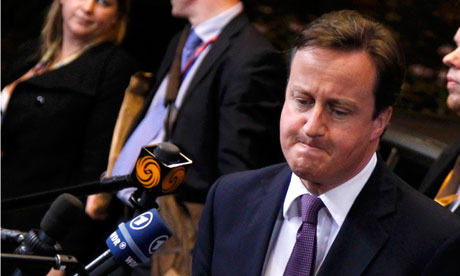The coalition and Europe
The veto that wasn’t
Conservative MPs wonder what their leader’s act of defiance amounts to
The Economist, Feb 4th 2012
FOR all its eventfulness, 2011 only produced one incident that really shifted the opinion polls. David Cameron’s refusal to support a new European Union (EU) treaty last December went down well with voters, who rewarded the Conservatives with their first lead over Labour in a year. It also cheered Tory MPs, many of whom had never warmed to their leader.
Their initial joy increasingly looks misplaced, and they know it. Mr Cameron had initially said that the countries which signed up to the new “fiscal compact” to strengthen the euro—potentially all 26 other members of the union—would not be able to use EU institutions such as the Commission and the Court of Justice. These are part-funded by the British taxpayer and meant to serve the whole EU.
Soon after, Mr Cameron was deluged by behind-the-scenes legal advice, which suggested that Britain would not get its way on the institutional matter, and by angry Liberal Democrats, the more pro-European of the coalition parties. Sure enough, by the time of an unofficial EU summit in Brussels on January 30th, the government had watered down its position. It now says only that it has “legal concerns” about the Court of Justice being used to enforce new fiscal rules. Although Mr Cameron says he will take action if the new arrangements compromise British interests, it is hard to see what, if anything, has been prevented by his veto.
The prime minister’s lack of a persuasive answer to that question was exposed on January 31st during perhaps the most difficult parliamentary session he has endured in the job. Ed Miliband, the Labour leader, mocked his “phantom veto” while Tory backbenchers interrogated their leader as to what his vaunted act of defiance had achieved. Meanwhile Lib Dem MPs commended Mr Cameron for changing his position—the kind of praise he could have done without.
Tory backbench grumbling could harden into something concrete. It is possible that the government will have to ask Parliament for more money for an International Monetary Fund (IMF) package to help euro-zone countries. Many Tory MPs are likely to vote against this; as recently as October, around 80 defied the party whip to vote for a referendum on EU membership. Worryingly for the government, Labour has hinted that it too may refuse to support the IMF request. The prospect of defeat on the issue is looming.
In and of itself, Mr Cameron’s backsliding on his own veto is not as important as the furore surrounding it might suggest. Britain, with its own currency, was never going to be subjected to the new rules on fiscal policy proposed by the treaty. If anything, Eurosceptics should be happy that Britain is moving to the outer circle of an increasingly integrated EU. In December Mr Cameron said he was mainly vetoing the treaty because it did not provide enough assurances on financial regulation, which poses a growing threat to Britain’s vast banking sector. Many in Downing Street wish he had stopped there. Instead he embarked upon the question of which countries would be able to use which institutions—a subject on which the government had previously declared no principled view.
But the rapid change in policy, and the confusion it has wrought, does expose one of the prime minister’s foibles. He sometimes neglects strategy and long-term planning. This is partly because he has so much confidence in his ability to respond to events as they happen—a faith largely justified by his track record. It also has something to do with his traditional Tory reluctance to turn his thoughts into grand, systematic plans. It is an approach that works much of the time. But in areas of profound importance and complexity, such as European diplomacy, it can be inadequate to the task.


No comments:
Post a Comment